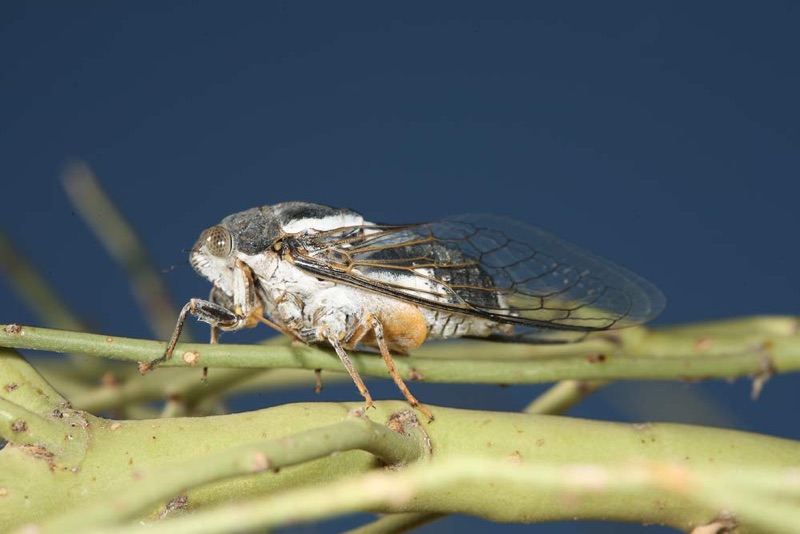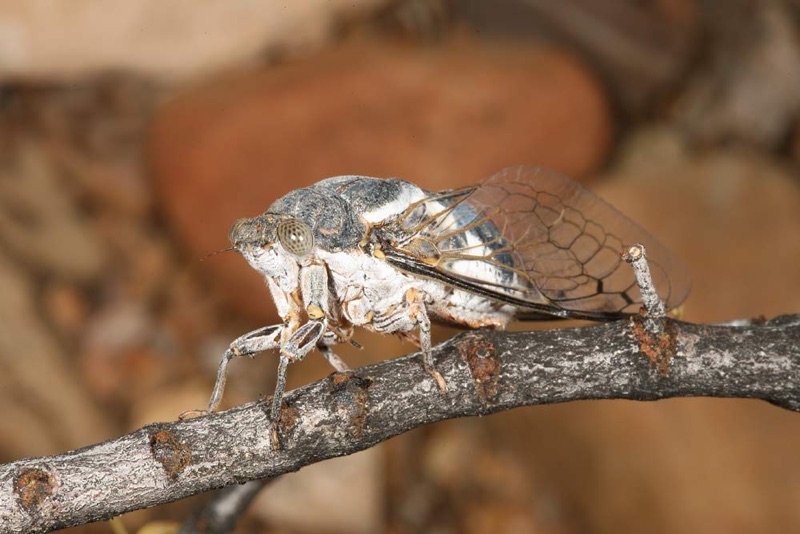Cacama valvata (Uhler, 1888) aka Common Cactus Dodger.

Male. Photo credit: by Adam Fleishman.

Female. Photo credit: by Adam Fleishman.
⢠See all C. valvata images and info on cicadamania.com.
Song:
Source: ©Insect Singers | Species: C. valvata
Name, Location and Description
- Cicada Name: Cacama valvata (Uhler, 1888)
- Short Name: C. valvata
- Common Name: Common Cactus Dodger
- When: May-June, peaking in June.
- Where it is found: AZ, CA, CO, KS, NV, NM, OK, TX, UT
- Maps: Biogeography of the Cicadas (Hemiptera: Cicadidae) of North America, North of Mexico [PDF]
- Description: Black with gold highlights and white pruinose.
- Eye Color: beige and black mix
- Pronotal Collar Color: black with gold highlights
- Identify: Bug Guide
- Identify: iNaturalist
- Images: Forestry Images
- Images: Insect Images
- Taxonomic Information: Integrated Taxonomic Information System
- Song: Insect Singers
Wm. T. Davis descriptions
A description of the Cacama cicadas from CICADAS OF THE GENUS CACAMA, WITH DESCRIPTIONS OF SEVERAL NEW SPECIES1:
In Cacama the tympanal coverings in the male entirely conceal the orifices, which is also the case in the genus Tibicen, but the head including the eyes is much narrower in Cacama, being little more than two thirds the width of the mesonotum. The abdomen is broad and much rounded behind ; in Tibicen it is more tapering. The apical areas of the fore wings in Cacama are eight in number, the two lowermost small and somewhat square in shape. In Tibicen the two lowest apical areas are not as nearly of the same size, the seventh being much smaller than the eighth.
Specifically about Cacama valvata:
Mr. Woodgate writes of the valvata he sent from Jemez Springs, N. M., that they were very shy and often found about the bush cactus. Some he took in the evening while they were at rest on the cactus. “They are the only insects except ants that can settle on the bush cactus without impaling themselves. The toughest beetles become impaled when they settle on this cactus and the ants proceed to eat them, but these Cicadas that have a very swift flight, can settle with impunity.” He says that “their song is not sustained for more than about two minutes in the brightest sunshine even.”
Classification:
Family: Cicadidae
Subfamily: Cicadinae
Tribe: Cryptotympanini
Subtribe: Cryptotympanina
Genus: Cacama
Species: Cacama valvata (Uhler, 1888)
List of sources
- (1) Davis, W.T. 1919. CICADAS OF THE GENUS CACAMA, WITH DESCRIPTIONS OF SEVERAL NEW SPECIES. Journal of the New York Entomological Society, Vol. XXVII, No. I. Read it on archive.org.
- Full Binomial Names: ITIS.gov
- Common names: BugGuide.net; The Songs of Insects by Lang Elliott and Wil Herschberger; personal memory.
- Locations: Biogeography of the Cicadas (Hemiptera: Cicadidae) of North America, North of Mexico by Allen F. Sanborn and Polly K. Phillips.
- Descriptions, Colors: personal observations from specimens or photos from many sources. Descriptions are not perfect, but may be helpful.
Notes:
- Some descriptions are based on aged specimens which have lost some or a lot of their color.
3 replies on “Cacama valvata (Uhler, 1888) aka Common Cactus Dodger”
What species would be emerging now in central Texas. We found an exoskeleton in our backyard in Kempner.
here’s the full Texas list: Common cicadas of Texas, but the 2 cicadas that are most abundant are the Neotibicen superbus (Fitch, 1855) aka Superb Dog-Day Cicada and Megatibicen resh (Haldeman, 1852) aka Resh Cicada. How big was the exoskeleton? The size of a dime, nickle, quarter, hafl-dollar?
⢠I used to think that these were the species that I heard in the trees, but it was actually N. Davisi.